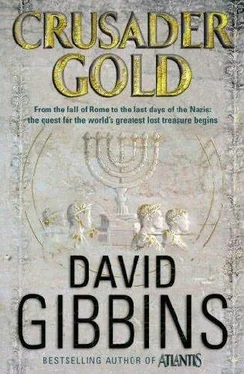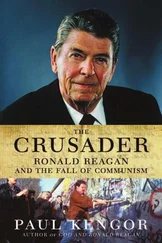David Gibbins - The Crusader's gold
Здесь есть возможность читать онлайн «David Gibbins - The Crusader's gold» весь текст электронной книги совершенно бесплатно (целиком полную версию без сокращений). В некоторых случаях можно слушать аудио, скачать через торрент в формате fb2 и присутствует краткое содержание. Жанр: Прочие приключения, на английском языке. Описание произведения, (предисловие) а так же отзывы посетителей доступны на портале библиотеки ЛибКат.
- Название:The Crusader's gold
- Автор:
- Жанр:
- Год:неизвестен
- ISBN:нет данных
- Рейтинг книги:3 / 5. Голосов: 1
-
Избранное:Добавить в избранное
- Отзывы:
-
Ваша оценка:
- 60
- 1
- 2
- 3
- 4
- 5
The Crusader's gold: краткое содержание, описание и аннотация
Предлагаем к чтению аннотацию, описание, краткое содержание или предисловие (зависит от того, что написал сам автор книги «The Crusader's gold»). Если вы не нашли необходимую информацию о книге — напишите в комментариях, мы постараемся отыскать её.
The Crusader's gold — читать онлайн бесплатно полную книгу (весь текст) целиком
Ниже представлен текст книги, разбитый по страницам. Система сохранения места последней прочитанной страницы, позволяет с удобством читать онлайн бесплатно книгу «The Crusader's gold», без необходимости каждый раз заново искать на чём Вы остановились. Поставьте закладку, и сможете в любой момент перейти на страницу, на которой закончили чтение.
Интервал:
Закладка:
“I can’t imagine any of them making it past St. Peter,” Costas said grimly.
“God will make the final judgement,” O’Connor replied. “But most assuredly there is a special place in hell for those who murder children.”
There was a knock on the door, and O’Connor got up and stared through the spy hole before unlatching it and letting Maria in. She sat down in the empty chair beside Jack and they looked expectantly at her.
She was pale, distracted. “I was right,” she said. “I’ve just spoken to an old friend who works for the Simon Wiesenthal Center.” Jack suddenly remembered Maria’s Jewish background, her father’s Sephardic roots. “Our Nazi was a failed student at Heidelberg, with delusions of being a famous anthropologist. He joined the SS in 1933. After the Ahnenerbe expedition he volunteered for the SS-Totenkopfverbande, the death’s-head units. The ones who ran the concentration camps. His name was Andrius Reksnys.”
“Not German?” Jack asked.
“Lithuanian,” she replied.
“There were plenty outside the Fatherland willing to heed Himmler’s call,” O’Connor said. Maria’s cellphone chirped, and she looked apologetically at them and quickly slipped out of the door. O’Connor tapped his laptop and clicked through a series of websites. “I know this man,” he said quietly. “Here he is.”
He swivelled the screen so they could see and read from a scanned document, translating from German.
The Chief of the Security Police and the Security Service, Berlin, 5 November 1941
55 copies
(51st copy)
OPERATIONAL SITUATION REPORT USSR NO. 129a
Einsatzgruppe D
Location: Nikolayev, Ukraine
Addendum to Report No. 129 concerning the activity of the Einsatzkommandos in freeing places of Jews and finishing off partisan groups. SS-Sturmbannfuhrer Andrius Reksnys personally executed 341 Jews. Revised total for the last two weeks: 32,108.
“Einsatzgruppen.” O’Connor forced out the word with revulsion. “Himmler’s mobile death squads. Responsible for murdering over a million Soviet Jews, among others.”
“How did this monster escape prosecution?” Jack asked.
“Usual story.” There was an edge of anger to O’Connor’s voice. “Shockingly few of the Einsatzkommandos were ever brought to justice. In the final Russian onslaught in 1945, Reksnys disguised himself as a Wehrmacht private and fled west, to surrender to the British. There were suspicions during his interrogation but nothing concrete. On his release in 1947, now named Schmidt, he recovered his son from an orphanage and went to Australia. Together they made a fortune mining opals near Darwin. Then in the mid-60s he sold his operation without warning and disappeared.”
“And the son?” Jack said. “Surely he was too young to have been in the war.”
“Pieter Reksnys was six years old in 1941,” O’Connor replied. “But there’s an eyewitness account from a Jewish survivor at the Einsatzgruppen trial, at Nuremberg in 1947, that spoke of a boy in Hitler Youth uniform accompanying Sturmbannfuhrer Reksnys in his work. It’s a chilling account, one of the worst of the trial. Apparently the boy loaded his father’s Luger between each batch of executions, even carried out some himself. It was this account that eventually made the connection when Interpol became involved in the 1990s, and led to Andrius and Pieter Reksnys being tracked down to Mexico, where the son ran a drugs and antiquities cartel. He’s now in his early seventies, and is still there.”
“Why so long?” Costas said incredulously. “Why did it take so long to identify them?”
“Contrary to the Hollywood version, chasing down Nazi war criminals was never a priority in the West after the late 1940s,” O’Connor replied. “The main intelligence agencies-the CIA, the British SIS-were completely wrapped up in Cold War espionage. They knew all about Eichmann and Mengele and the other Nazis who had escaped to South and Central America, but few thought they posed a threat. Only the Israelis put serious efforts to bringing any of them to justice.”
“And now we reap the rewards,” Costas muttered.
“Not entirely.” O’Connor opened a drawer and placed a plastic sleeve with a photograph on the table. “You probably won’t remember this. A footnote in the newspapers about eight years ago, but actually the highest-profile Nazi death since Eichmann.”
The picture was a shocking image of a dead man lying on his back in a pool of blood, his eyes and mouth wide open and his face contorted with pain. He was an old man, wearing a dark suit, with his right arm flung over his front; visible through the smear of blood was a red armband with a black swastika.
“He wore that armband in the privacy of his own home,” O’Connor said. “An unreconstructed Nazi to the end. In case you haven’t guessed, that’s Andrius Reksnys. He was shot in the stomach to ensure a slow death, to give him time to be really frightened of where he was going next.”
“Mossad?” Costas asked.
“There is liaison with the Israelis,” O’Connor replied quietly. “But this was an independent operation.”
“What are you saying?”
O’Connor’s face was blank. He spoke coldly. “Andrius Reksnys was a henchman of the devil. All the efforts of international law had failed to bring him to account. He deserved to face the judgement of humanity, as well as God.”
“Are you saying the Vatican runs a hit squad?” Costas said incredulously.
“The Holy See is not just a spiritual beacon,” O’Connor said. “For centuries our survival has depended on strength in the world of men, on the power to persuade the unwilling to submit to God. Look at my own order, the Jesuits. Or the Crusades. Or the Inquisition. For centuries the Vatican has overseen the most successful covert intelligence network in the world, and has never shrunk from using it.”
“The Crusades were hardly a glorious episode, even if the intention was righteous to begin with,” Costas muttered. “I can’t imagine the sack of Constantinople was quite what the Pope had in mind.”
“You’d be surprised,” O’Connor said. “The papacy has always had to resist being drawn too far into the secular world, losing sight of the spiritual plane that bonds together all Christians. By the time of the Fourth Crusade the Vatican had developed a real problem with the Eastern Church, schismatics whom they regarded as heretics. It became a feud, and like all feuds led the antagonists to lose reason. Some apologists for the sack of Constantinople even twisted it into God’s actual purpose for the Crusade, punishment for deviating from the true path.”
“The feeling was reciprocated,” Jeremy added. “The Byzantine eyewitness Niketas Choniates called the Crusaders the forerunners of Antichrist, chief agents of his anticipated ungodly deeds.”
“The Holy See has always faced temptation from the dark side,” O’Connor continued. “Those who struggle against the devil can so easily end up doing the devil’s work. The Crusades were the ultimate challenge of the Middle Ages, and we did not always overcome. Monstrous tendencies have exploded into history in our moments of weakness. There are those among us who feel we owe a debt for failing to stem the greatest evil of all, the Nazi Holocaust.”
“So Reksys’ death has nothing to do with the menorah,” Jack said.
O’Connor paused, then stood. “I fear I may have misled you. His death has everything to do with the menorah. Please bear with me.”
There was another knock at the door, and O’Connor ushered Maria back in. She sat down, fingering her cellphone. “I’ve got news from Hereford,” she said, looking serious. “Fantastic news. My team from the Oxford Institute has finished excavating the manuscripts from the sealed-up stairway. It’s amazing, the greatest trove of Anglo-Saxon manuscripts ever discovered. It’s like finding the Roman library in the Villa of the Papyri at Herculaneum, and it’s going to be just as much work putting the pieces all together again.” She glanced at Jeremy, who was leaning forward in rapt attention. “Unless you’re in a hurry to return to the States, there’s going to be a full-time job looking after all this.”
Читать дальшеИнтервал:
Закладка:
Похожие книги на «The Crusader's gold»
Представляем Вашему вниманию похожие книги на «The Crusader's gold» списком для выбора. Мы отобрали схожую по названию и смыслу литературу в надежде предоставить читателям больше вариантов отыскать новые, интересные, ещё непрочитанные произведения.
Обсуждение, отзывы о книге «The Crusader's gold» и просто собственные мнения читателей. Оставьте ваши комментарии, напишите, что Вы думаете о произведении, его смысле или главных героях. Укажите что конкретно понравилось, а что нет, и почему Вы так считаете.












